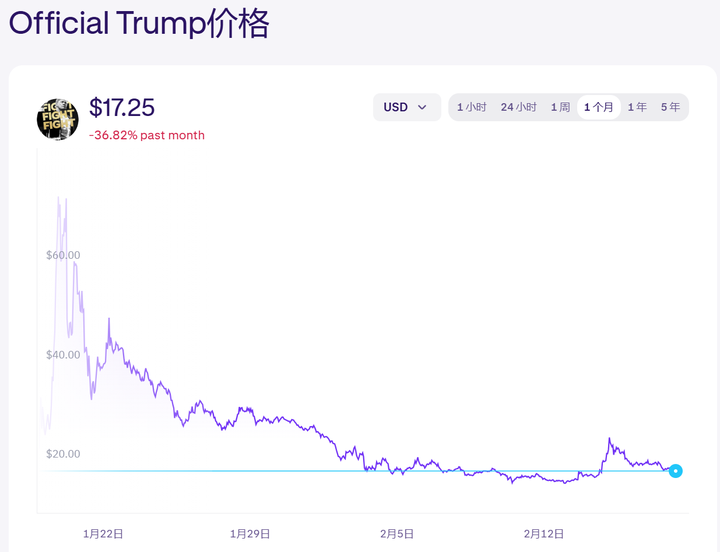The speculative frenzy surrounding Memecoins is damaging Bitcoin's credibility, and policymakers and industry leaders must clarify the situation, guard against hype scams, and avoid the risk of regulatory crackdowns on the crypto market.
Author: Dave Birnbaum
Translation: Baihua Blockchain

Argentinian President Javier Milei on November 19, 2023, in Buenos Aires
A series of eye-catching "Memecoin exit scams" is raising concerns that this "crypto" craze is undermining Bitcoin's reputation as a robust monetary asset. From the Trump administration's support for the TRUMP Token, to the First Lady's endorsement of a Memecoin, and the LIBRA scandal in Argentina, these speculative frenzies have repeatedly made headlines, blurring the lines between Bitcoin— a digital currency likely to become the cornerstone of the 21st-century economy— and various hype-driven sell-off projects.
In any case, Bitcoin is unlikely to be significantly affected. However, what may be unsustainable is Trump's plan to reform the regulatory framework for digital assets to provide much-needed guidance and clarity for financial innovators. On the contrary, this administration's naive and indiscriminate admiration for the crypto market is harming retail investors— a bitter reality for the Bitcoin community.
More broadly, the global liberal movement has only just entered the centers of power, yet it may be stigmatized at this critical moment due to financial speculation, just as people are hoping for "real adults" to take charge. Javier Milei, a knowledgeable economist and a staunch supporter of sound money, has promised to take radical measures, such as shutting down the Central Bank of Argentina and promoting the development of gold and Bitcoin.
Today, one crypto scam after another is unfolding, and the Bitcoin community's long-standing warnings about the "crypto casino" are being validated. The victims are not just the investors who have been taken advantage of. Most newcomers still do not realize the fundamental difference between Bitcoin and speculative altcoins, and may overlook Bitcoin's potential as a neutral and immutable currency. Now is the time for influential figures and policymakers to make it clear: Bitcoin is the only digital asset that can provide truly sustainable value for large institutions and the global economy.
1. The Rise and Fall of Memecoins
Recently, the volatile Memecoins have created a massive frenzy, while also bringing countless heartbreaks. These events once again demonstrate the severe consequences of conflating Bitcoin with the entire crypto market.
1) The LIBRA Farce in Argentina
In Argentina, a crypto project called LIBRA almost overnight turned into a national scandal. In mid-February, newly elected President Javier Milei—who claims to be a libertarian and a Bitcoin supporter—posted on social media to endorse the LIBRA Token, promoting it as a private initiative aimed at boosting the Argentine economy. Followers and retail investors rallied to Milei's call, and the price of LIBRA skyrocketed from $0 to nearly $5.
However, within just a few hours, the price of LIBRA plummeted over 80%, falling below $1. Blockchain analysts quickly revealed the reason: internal wallets sold off almost immediately after the Token went live, cashing out over $107 million, while ordinary investors could only watch their funds evaporate. The Argentine Fintech Association also acknowledged that the operation of this event was no different from a typical "exit scam."
2) Political Turmoil Erupts Quickly
Opposition lawmaker Leandro Santoro quickly spoke out, stating: "This scandal has shamed us internationally, and we must initiate impeachment proceedings against the president." Milei promptly deleted his promotional post and hurriedly distanced himself from LIBRA, arguing: "I was not aware of the specifics of the project, and once I learned the details, I decided not to promote it anymore."
But for the thousands of trapped investors, everything was already set in stone. A Token endorsed by the nation's highest leader ultimately proved to be a "pump and dump" scam, casting a shadow over Argentina's first president in at least a century who truly understands economics. This farce fully demonstrates how irresponsible cryptocurrency policies can undermine the credibility of an entire political movement.
3) Trump's TRUMP Token
On the other side of the globe in the United States, a larger-scale Memecoin frenzy is unfolding, and this time it directly involves the nation's highest leader.
In January of this year, U.S. President Donald Trump launched an official Memecoin TRUMP on the Solana blockchain. The Token was promoted as the "only official Trump Memecoin," leveraging Trump's personal brand and the trust associated with the MAGA (Make America Great Again) movement, creating a frenzy before his inauguration.
The level of enthusiasm was so extreme that it was rare even in the cryptocurrency market. Within just a few days of its launch, the price of TRUMP skyrocketed, with its total market cap briefly surpassing $14.5 billion, and the price per token reaching as high as about $73. This historic surge coincided with the "Crypto Ball" held in Washington D.C., an event hosted by tech investor and Trump's administration's "Crypto Tsar" David Sacks.
However, after the party, reality quickly bit back. As the guests of the crypto gala were still nursing their hangovers, the price of TRUMP plummeted within days. By early February, just two weeks later, the price of the Token had dropped by two-thirds.
On-chain data analysis firm Chainalysis found that the 50 largest holders each cashed out over $10 million, while about 200,000 retail investors suffered heavy losses during the crash. Ultimately, insiders made a fortune, while many retail MAGA supporters who may have been attracted by the "Trump" brand became the bag holders.
According to Reuters, the trading platform Meteora, where the $TRUMP Token was launched, rebates transaction fees back to the Token issuer. In just two weeks, the team behind TRUMP earned approximately $86 million to $100 million from trading fees.

Source: kraken.com, as of February 18
4) Melania Trump's Memecoin Frenzy
Just a few days after the launch of the TRUMP Token, First Lady Melania Trump quickly followed suit, leveraging her personal brand to launch a Memecoin. Less than 12 hours before the presidential inauguration, she announced the issuance of her personal Token MELANIA on the Solana blockchain.
Once launched, the Token immediately sparked a new wave of speculation. Many early investors who witnessed the profits from TRUMP believed this was their "second chance." Within just a few hours of its issuance, the price of MELANIA surged 24,000%, peaking at about $13, with a total market cap nearing $1.8 billion in a single day.
However, reality soon struck hard. Just that same weekend, MELANIA plummeted 80% from its peak, falling below $3. Similar to TRUMP, the Token distribution and issuance intentions of MELANIA were also called into question. Analysts pointed out that 80% of the supply of the TRUMP Token was held by a single whale address, and MELANIA faced a similar high concentration issue.
5) "First Family" Crypto Speculation Faces Bipartisan Criticism
The cryptocurrency actions of the Trump couple quickly drew criticism from both sides of the U.S. political spectrum. Although accusations of self-enrichment may be difficult to substantiate—after all, the Trump family is already extremely wealthy and does not need to rely on get-rich-quick schemes—what is more realistic and disappointing is that the judgment displayed by Trump's two sons—Donald Trump Jr. and Eric Trump, as well as Trump's administration's "Crypto Tsar" David Sacks, in this series of events is far from the maturity their positions should possess.
2. Trump's Crypto Policy: A Double-Edged Sword for Bitcoin
The aforementioned scandals share a common point: they all involve speculative altcoins that rely on hype, insider manipulation, and a lack of transparency, which is in stark contrast to the principles represented by Bitcoin. For years, veterans of the Bitcoin community have been working to distinguish Bitcoin from the "crypto market" because they are acutely aware of the dangers that such confusion can bring.
The Bitcoin community has quickly distanced itself from these farces. Unlike Bitcoin, the prices of these altcoins are entirely dependent on "greater fool theory" style speculative hype, while Bitcoin is a neutral, decentralized payment network with hundreds of millions of users and follows a predictable monetary policy. These scams not only harm investors but could also stain the reputation of the entire digital asset space, potentially affecting Bitcoin as well.
Despite this, the Bitcoin community still hopes that the Trump administration can bring about a reasonable regulatory environment that fosters innovation in the fintech industry and accelerates the adoption of Bitcoin. For millions of Americans holding Bitcoin, tax reform and increased regulatory transparency are undoubtedly welcome.
However, indiscriminately promoting cryptocurrencies may do more harm than good. If the public's impression of "cryptocurrency" is limited to these pump-and-dump scams, rather than recognizing Bitcoin's potential in combating inflation and financial instability, the long-term development of the crypto industry will face serious obstacles. If Trump's so-called "promotion of the crypto industry" merely condones or even participates in these speculative activities, it could ultimately lead to harsher regulatory crackdowns. Once the market crashes, the government may view all digital assets as sources of risk, leaving even Bitcoin businesses and users vulnerable.
Poor regulation often stems from negative public opinion storms. If the collapses of LIBRA and TRUMP are used as excuses for regulatory crackdowns, some hostile policymakers may take the opportunity to target Bitcoin — even though it was not involved in these scams at all — and introduce punitive new regulations.
3. It's Time to Reaffirm Commitment to Bitcoin
The urgent task is to establish a clear policy that encourages the widespread use of Bitcoin as a reserve asset, payment network, and vehicle for innovation. Policymakers and influential figures in the tech and finance sectors have a responsibility to clearly distinguish Bitcoin from "cryptocurrencies." In the current farce, key figures like David Sacks and Chamath Palihapitiya can play a crucial role.
Sacks, as a well-known venture capitalist and political donor, hosted the "Crypto Ball." However, rather than focusing on the flashy hype of meme coin parties, these industry thought leaders should leverage their influence to educate newcomers about the unique value of Bitcoin and remind them of the risks associated with chasing altcoin surges.
Chamath Palihapitiya, as an early investor in Bitcoin, has a large audience. He has publicly stated multiple times that Bitcoin could be the "ultimate insurance" and will occupy a central role in the future financial system. However, he is also an investor in the Solana ecosystem, which is the **technical foundation for a recent series of pump-and-dump scams. This contradictory messaging is not only confusing but also undermines Bitcoin's core value. Given Chamath's influence in Silicon Valley and Wall Street, he is fully capable of explaining to the market how *Bitcoin's fundamental attributes (scarcity, decentralization, security) make it fundamentally different from those speculative Solana Tokens.*
For Sacks, Chamath, and all influential figures in the tech and finance sectors, their mission should be to responsibly utilize their platforms. Compared to hosting the Crypto Ball or making bold price predictions, educating the public may not be as eye-catching, but it is crucial at this moment. These industry leaders should focus on how Bitcoin empowers the global financial system, such as its practical applications in high-inflation countries or among unbanked populations, contrasting it sharply with the empty promises of meme coins. They can advocate for the industry to establish norms that view Bitcoin as an emerging digital commodity and reserve asset, while unverified altcoins should be classified as risky stocks or gambling applications. Only in this way can the risk of investors falling into scams be reduced and the market's understanding of Bitcoin's value be genuinely enhanced.
Now is the time to take action. Industry leaders, investors, and policymakers must stand up, demand transparency, expose misconduct, and defend Bitcoin's value as sound money. Only by clearly supporting Bitcoin and firmly opposing scams can the market's focus return to the right track—how Bitcoin can improve society. For the livelihoods of investors and the future applications of Bitcoin, this moment of silence or compromise could be costly.
It's time to make Bitcoin great again.
Article link: https://www.hellobtc.com/kp/du/02/5678.html
Source: https://www.forbes.com/sites/davidbirnbaum/2025/02/16/crypto-fiasco-series-of-shameful-scams-hurt-the-case-for-bitcoin/
免责声明:本文章仅代表作者个人观点,不代表本平台的立场和观点。本文章仅供信息分享,不构成对任何人的任何投资建议。用户与作者之间的任何争议,与本平台无关。如网页中刊载的文章或图片涉及侵权,请提供相关的权利证明和身份证明发送邮件到support@aicoin.com,本平台相关工作人员将会进行核查。




